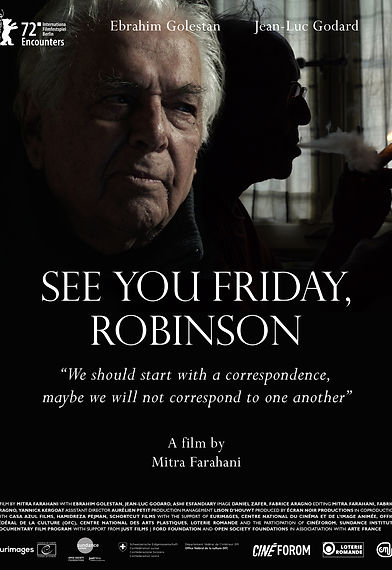
Last month, Acropolis celebrated the life and legacy of Jean-Luc Godard with a double-bill of rarely seen films by and about the late French-Swiss master. The tribute continues in January with Mitra Farahani's elegiac portrait of Godard's final years and the long-distance correspondence he struck up over this time with the great, if lesser known, Iranian director and novelist Ebrahim Golestan (Brick and Mirror), now 100 years old and living in a castle in England.
In taking up his producer Mitra Farahani’s playful challenge—to see where this much-belated correspondence would lead them—Godard, ever the devilish imp, began sending Golestan a series of cryptic and gnomic fragments of text and image, always signing off “See You Friday, Robinson!” in punning reference to Daniel Defoe’s novel Robinson Crusoe. These messages in a bottle, cast out from the isolation of his home in Rolle, Switzerland, comprise some of Godard’s concluding and yet (as ever) inconclusive statements on language, cinema, politics, death, regret, and love. Golestan replied in turn with his own profoundly moving and subversively funny thoughts on these big existential questions, as well as on the mundanities and frustrations of old age.
Winner of the Special Jury prize in the Encounters section at the 2022 Berlinale, See You Friday, Robinson forms a loose trilogy with Farahani's previous portraits of artists in late career: Behjat Sadr in Behjat Sadr: Time Suspended (2006) and Bahman Mohassess in Fifi Howls from Happiness (2013). Farahani is also the co-producer of Godard’s The Image Book (2022), and his forthcoming film Scénario, and she has been instrumental in the restoration of films by Ebrahim Golestan and Forough Farrokhzad, including their masterful collaboration The House Is Black (1962).
Revelatory... testifies to the poetic power of image-sound amalgams and to the fragility of all life.
- Amy Taubin, Artforum
Touching... like a drink with an old friend who never stopped thinking onscreen.
- Nicolas Rapold, The New York Times
As inspired as it is unusual... reminds us that no great filmmaker was ever as connected (and indebted) to the literary modernism of Joyce, Pound, Eliot, et al. as Godard.
- Godfrey Cheshire, RogerEbert.com
Startling... this abrasive, Godardian feature, whatever its intentions, has a lot to say about the class that Farahani, Godard and Golestan all belong to: the high bourgeoisie.
- Jonathan Rosenabum, New Lines Magazine
Refreshingly honest... playfully appropriates Godardian aesthetics—intrusive title screens, erratic music cues, citations of other films—to capture a string of communications whose substance is as elusive as one of the French New Wave maverick’s films.
- Pat Brown, Slant Magazine
(Available to download after screening date)